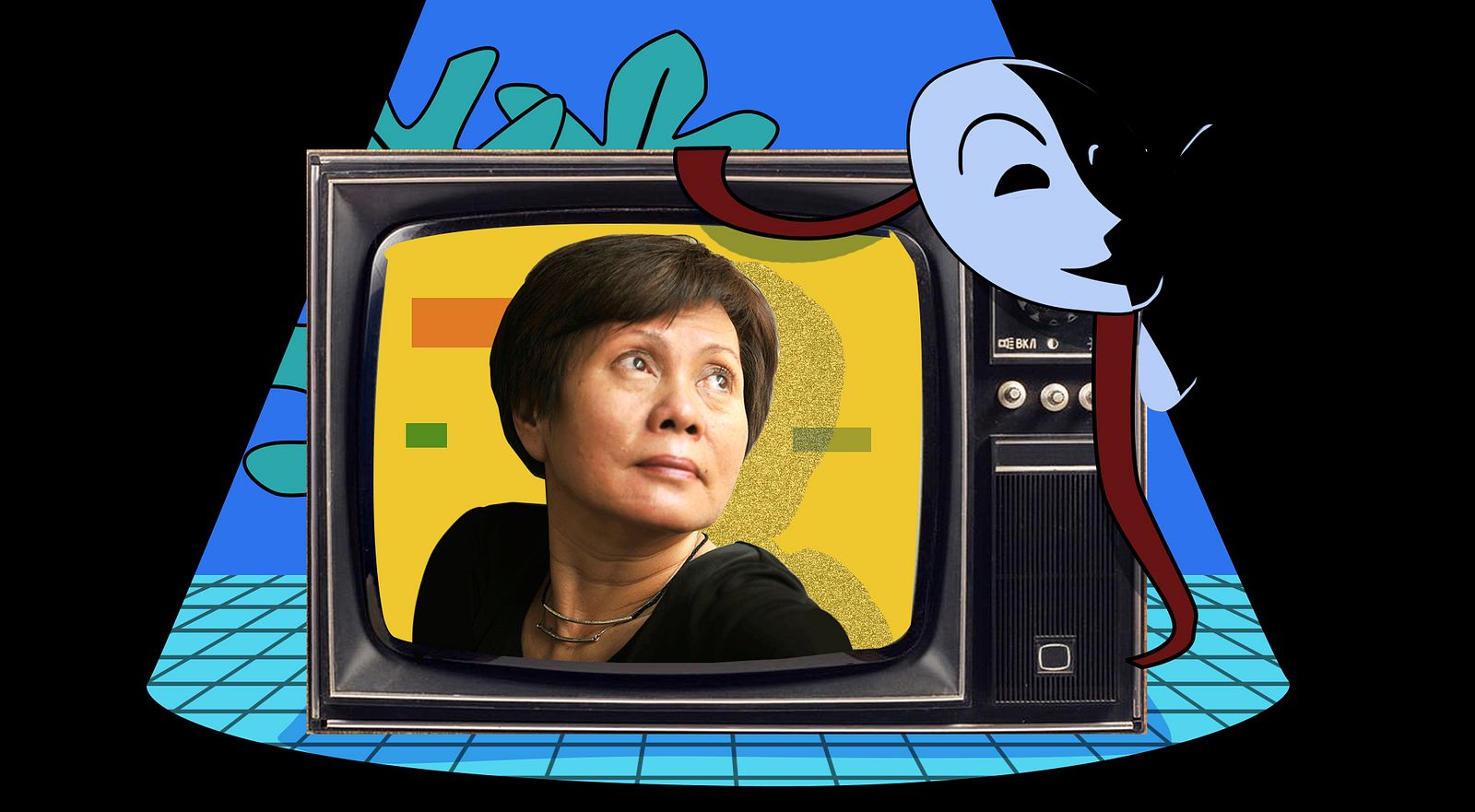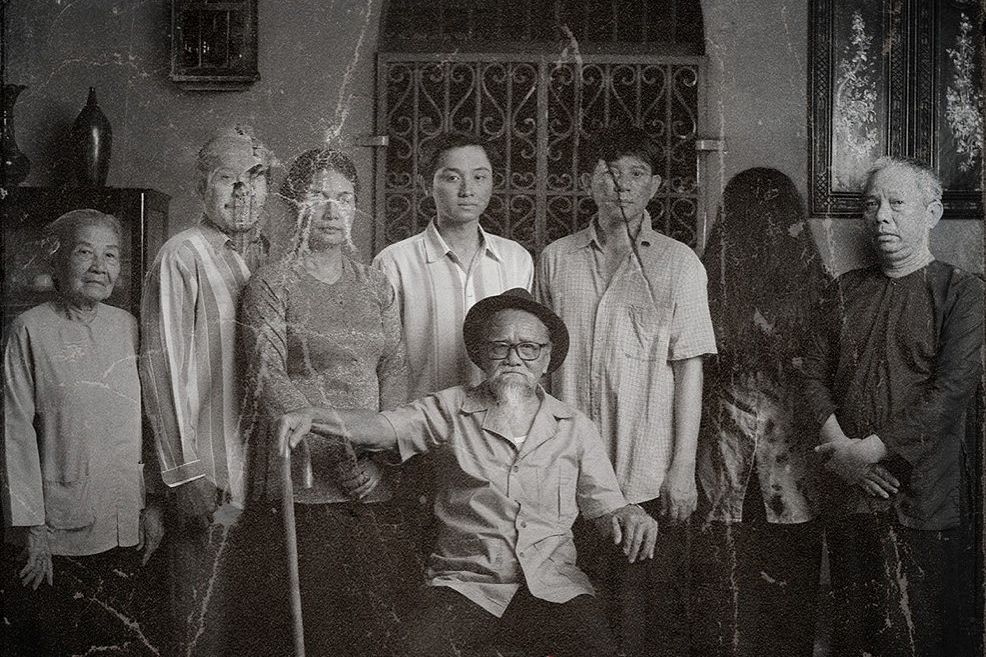Personally honest, socially important and commercially sexy, modern movies about gay and transgender people are among the better works of contemporary Vietnamese cinema.
Starring two handsome actors, Thưa Mẹ Con Đi (Goodbye Mother), directed by Trịnh Đình Lê Minh, is a gratifying movie that earns its place among the better of Vietnam’s recent LGBT films.
The movie, one of two Vietnamese entries shown at Busan International Film Festival in 2019, captures the tension between a gay couple, who are returning home to Vietnam after living in the US, and a typical patriarchal Vietnamese family.
The head of the family — widowed mother Hạnh (played superbly by actress Hồng Đào) — welcomes her only son Văn home after he completes his studies in America. She tries to act as a matchmaker and find a partner for Văn in the hope that he will get married, have children and carry on the family lineage. Unfortunately for Hạnh and everybody else, Văn (played by Lãnh Thanh), has a confession to make.
Artfully shot and with a simple and tight script, Goodbye Mother builds a reasonable pace through numerous dramatic sequences towards the ultimate moment of truth in which the mother learns of and has to reconcile with the fact that her son will love no one but his boyfriend Ian (played by Võ Điền Gia Huy).
▪
Trịnh Đình Lê Minh’s casting is brilliant. Lãnh Thanh and Gia Huy are fetching in different ways. As they play the roles of polite gentlemen whose only “sin” is being in love with each other, the characters win audience's heart just as easily as they are able to persuade the mother and her in-law family to support their relationship.
Though there is some real tension, the men seem to be drawn just a little too lovely and perfect. There is no doubt in one’s mind that, sooner or later, they will have their way. They are like a couple of innocent cupids from some lofty American nation touching down on the bosoms of a womanly Vietnamese culture that is already inclined to spoil them.
Not only is the mother indulgent, but the paternal grandmother also conveniently has a mental problem that makes her mistake Ian for Văn, and thus unquestionably transfers her love for her grandson to his male lover. What’s more, Văn’s younger cousin, a high school-aged girl also develops a heterosexual crush on Ian, making the gay men the center around which all women revolve.
Ultimately, though, Goodbye Mother is a decent effort, and brings to mind other notable films, both fictional and documentary, about homosexuality and transgender people in Vietnam: Vũ Ngọc Đãng’s groundbreaking movie Lost in Paradise; Việt Max’s Yêu (Love), a remake of Thai movie The Love of Siam; Nguyễn Thị Thắm’s Madam Phụng’s Last Journey; and Trần Phương Thảo’s Finding Phong.
The lingering influence of Vietnam’s “first gay film”
When it came out in 2011, Vũ Ngọc Đãng’s verbosely titled movie about gay men, prostitutes and, to a lesser extent, people living with mental disability, Hot Boy Nổi Loạn Và Câu Chuyện Về Thằng Cười, Cô Gái Điếm Và Con Vịt, or Lost in Paradise in English, turned out to be this promising director’s best work.
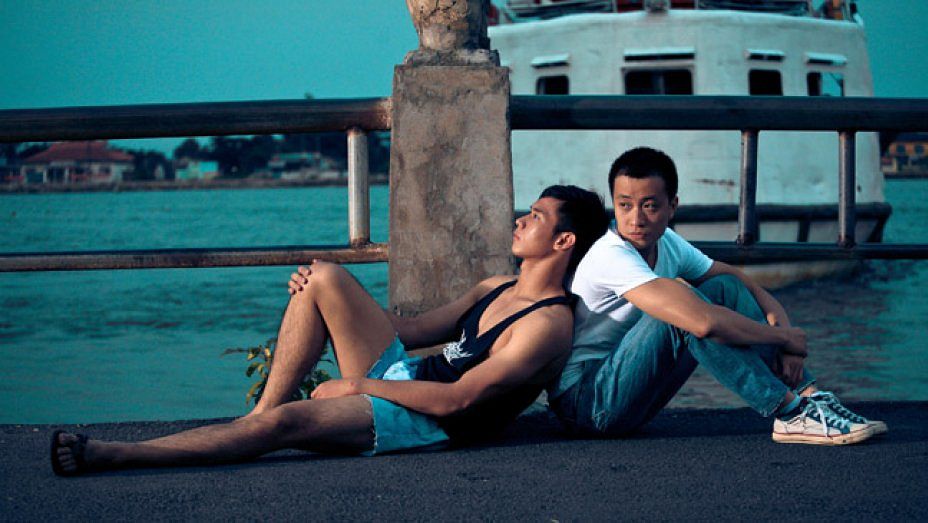
A screenshot from Lost in Paradise. Image via The Hollywood Reporter.
Lost in Paradise, hailed as Vietnam’s “first gay film,” won a batch of local prizes and was featured at several international film festivals. The film shows how Đãng had progressed from his earlier naïve, symbolic films to assured realism. The two gay heroes in Lost in Paradise are rich and real and suffer a far sadder fate than the couple in Goodbye Mother.
Đãng's queer characters are unlike the familiar showbiz girls of his earlier commercial hits Những Cô Gái Chân Dài (Leggy Girls) and Đẹp Từng Centimet (Beautiful in Every Centimeter), nor are they akin to the symbolic characters in his first major work, Chuột (Mouse), a high-minded story about a runaway criminal’s psychological journey before turning himself in.
Lost in Paradise’s gay men are something in between, and show how Đãng’s cinematic world has grown from a dream inside his head in Chuột, to a small, reality-based showbiz world he knows best, to a more expansive and realistic world including people on the fringe of society.
Yet Lost in Paradise remains a little distracted. While it should focus on the more touching and interesting storyline about homosexuality, the movie spreads itself thin with a parallel narrative about a man living with mental health issues who tries to raise a duckling and befriends a struggling female prostitute.
It took nearly a decade for this budding portrait of male homosexuality to be picked up again and given a more thorough treatment in Goodbye Mother.
Gay artist motifs

A promotional poster for Yêu, starring Gil Lê and Chi Pu.
Lesbianism has also been addressed in contemporary Vietnamese cinema. Though based on Thai movie about gay men The Love of Siam, rather than a homegrown idea, Việt Max’s 2015 movie Love, which depicts an aspiring singer and her childhood girlfriend, flips the gender switch and offers long-overdue limelight to strong female characters here in Vietnam. It is especially interesting to see how men are portrayed in the movie — they are rejected by the gay women.
Though Love lacks the complexity and depth of the original Thai version, it is nonetheless a creative remake that had to forge new male characters to help portray the lesbian relationship. The depictions of those male characters are fairly realistic and convincing and one can understand why the girls would still reject them even if they weren’t homosexual. One man in particular, who comes from a rich family, leads a ridiculously boyish, clueless and wasteful life.
Love’s motif of a talented homosexual artist appears again in Leon Quang Le’s Song Lang, which came out last year and won numerous local and international awards. Song Lang, whose title refers to a percussive instrument used in cải lương as well as a pair of young men, skillfully weaves together a tragic legend, an impossible relationship between two men, and a thrilling crime plotline in a laudable tribute to southern folk opera.
The movie, which is set in Saigon in the 1980s, explores the heyday of southern folk opera. Its protagonist Linh Phụng, a gentle, talented southern folk opera singer, meets and falls for Dũng “Thunder Genie,” a ruthless debt collector who also loves cải lương.
Linh Phụng almost brings a second chance at happiness to Dũng, who has incurred much wrath and hatred along his faltering career path. But their relationship isn’t meant to be, and not just because their fate is inextricably linked to an unhappy social context filled with desperate debtors and greedy loan sharks.
Their fate cannot be separated from Vietnam’s turbulent history of wars, division and loss, either. Song Lang makes effective symbolic use of the Mị Châu-Trọng Thủy legend, in which Emperor An Dương Vương lost his country as a consequence of his daughter’s traitorous liaison with her Chinese husband.
Song Lang’s version of this legend features seamlessly throughout via southern folk opera performances, in which Linh Phụng plays Trọng Thủy, the Chinese prince, while Vietnamese princess Mi Châu’s fate mirrors what befalls Dũng. With beautiful, richly colored sets designed to evoke a sense of Saigon’s gritty past, Song Lang is a dexterous feast for a debut.
On educational values
Two documentaries about gay and transgender people also do justice to their subject matter. Vietnamese documentaries are mostly 30-minute films made for TV by the Vietnam National Documentary and Scientific Film Studio, so any full-length works made by independent filmmakers themselves are commendable efforts.
Both Nguyễn Thị Thắm’s 86-minute debut documentary Madam Phung’s Last Journey (2014) and Trần Phương Thảo and Swann Dubus’s Finding Phong (2018) are well-made films. In the former, Thắm painstakingly follows a traveling fair led by Bích Phụng, a queer man. The troupe includes 35 members, most of whom are gay or transgender.
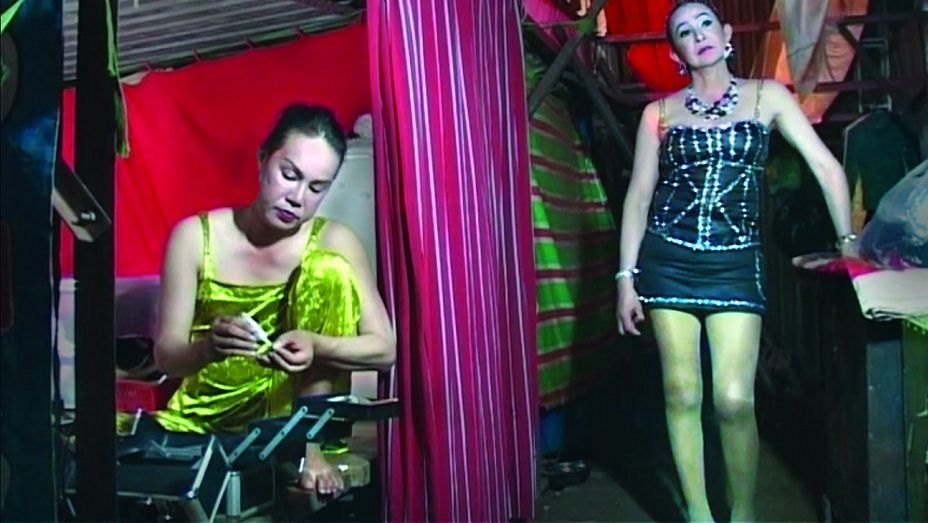
Madame Phung's Last Journey. Image via The Hollywood Reporter.
When it comes to real life, the troupe members featured in these two documentaries earn their living by working on the stage. Whether or not they are artistic geniuses as suggested by the familiar stereotype is a matter of debate, but one thing is clear: they are earnest, hard-working people.
Bích Phụng’s troupe travels from Đà Nẵng to Cà Mau staging fairs comprising activities such as singing and dancing, lottery games, and amusement rides. Along the way, they encounter hostile locals whose belligerence culminates in a destructive act at the end of this dramatic documentary.
Contrastingly, for all its real-life elements, Finding Phong is richly symbolic and captivating. Unlike Thắm’s film, which focuses on a group, Thảo and her husband’s documentary focuses the spotlight on one person, a trans woman named Phong who earns a living by painting puppets for the Thăng Long Water Puppet Theatre in Hanoi.
The filmmakers gave Phong a camera to film herself as she went through the clinical and emotional stages of her gender reassignment and then combined Phong’s footage with their own shots. Phong’s journey is difficult but with scenes that bring both tears and laughter and a lovely ending, the documentary is easy to watch.
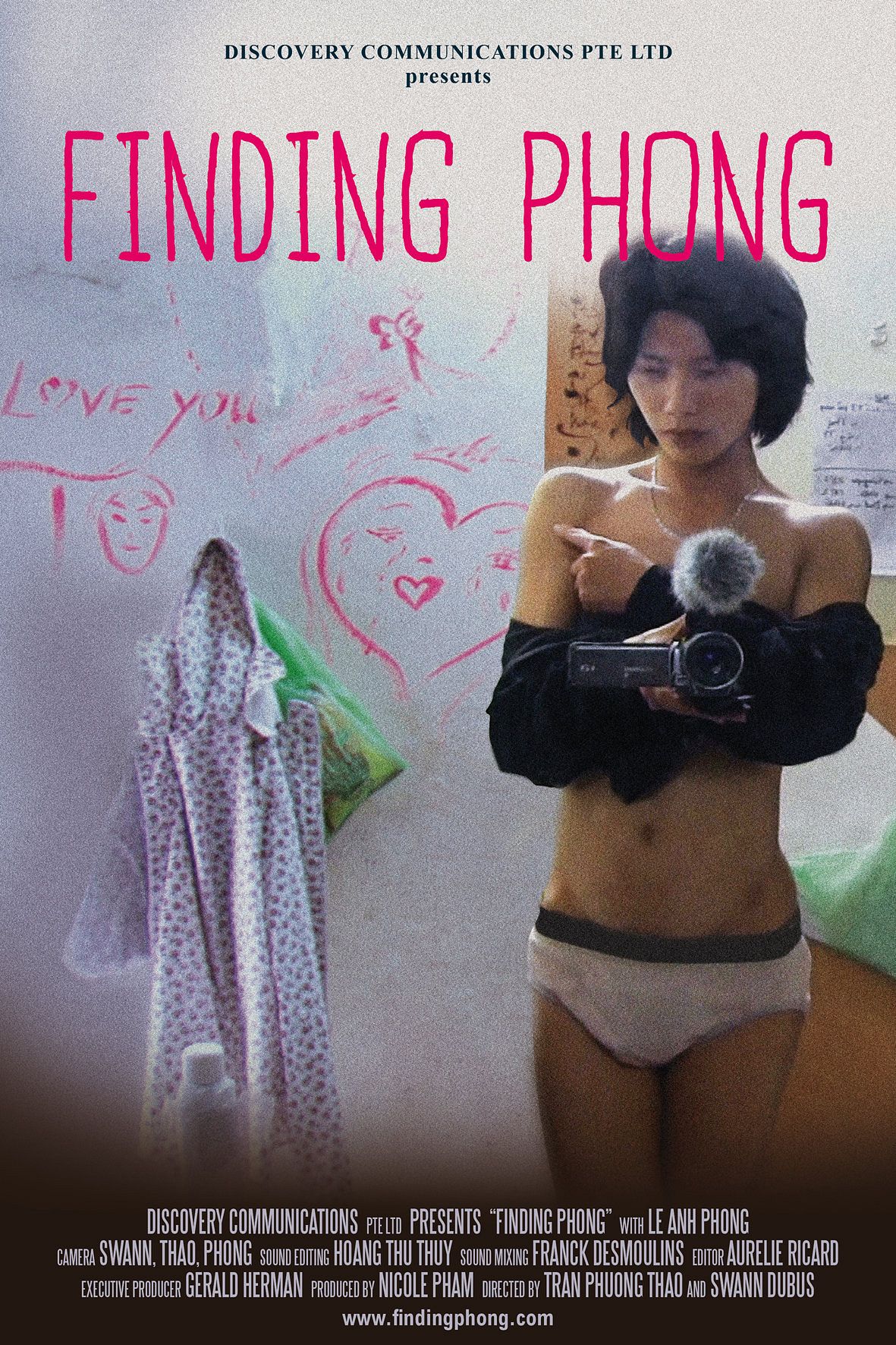
A poster for Finding Phong. Image via IMDB.
In one highly artistic shot, Phong, who is now female but still retains her given name for the sake of her parents, dances and slowly fades away in a hallway, and the director adeptly captures the mercurial and elusive nature of sex, gender and life itself.
Encouragingly, both documentaries were screened in commercial theaters, which is a rare achievement for the documentary genre in Vietnam. Perhaps what’s most promising, is that a screening of Finding Phong that this writer attended attracted a considerable number of enthusiastic youngsters, showing the viability of socially important themes when they are treated both seriously and with artistic skills.
This article was originally published in 2019.
[Top image via Tin247]






